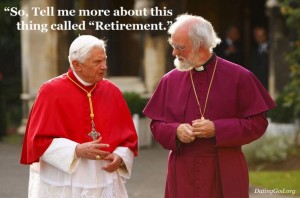Like the head of the Anglican communion before him, Pope Benedict XVI has stepped down from his post as chief shepherd of his flock. The stories, both yesterday and today, have focused much of their time on his legacy–with predictable results. Erin Burnett on CNN last night was a typical example; she had on Sister Simone Campbell and Brian Finnerty to talk about…wait for it…gay marriage, women priests, and sexual abuse. That’s it. We could not be more familiar with this aspect of Pope Benedict given it has been thrust into our faces via the glowing rectangles of our TVs, computers and smartphones for the past eight years.
But for those who have the capacity to imagine him as somebody other than Emperor Palpatine this image of the Pope as a homophobic, misogynist protector of child abusers (or, better yet, future football coach at Penn State) will be dismissed for the kind of polarizing, ratings- and hits-generating nonsense that it is. Though we should not paper over the mistakes he has made during his pontificate (John Allen summarizes several of them here), any fair discussion of Benedict’s legacy would have to go beyond hit jobs masquerading as journalism.
Benedict will be remembered as the first “Green Pope” given his explicit and public efforts to strongly connect moral imperatives toward creation with the Church’s broader social teaching. And this is not mere rhetoric. Under his watch, the Vatican has become the world’s first carbon neutral country by offsetting its carbon emissions though renewable energies and carbon credits. Benedict has personally led on the topic of renewable energy by instituting projects to put thousands of solar panels on various Vatican buildings—reducing carbon dioxide emissions by about 225 tons and saving the equivalent of eighty tons of oil each year. This project captured the 2008 Euro Solar Prize, awarded by the European Association for Renewable Energy, a secular body. This already impressive project is part of an even more impressive commitment to have 20% of the Vatican’s energy come from renewable resources by 2020. In addition, as we have discussed several times on this blog, Benedict also has a great love and concern for non-human animals.
Remember also that Benedict had the following to say in an interview with Peter Seewald, complexifying his view of sexuality and its relationship to contraception in ways the Church is just beginning to unpack:
There may be a basis in the case of some individuals, as perhaps when a male prostitute uses a condom, where this can be a first step in the direction of a moralization, a first assumption of responsibility, on the way toward recovering an awareness that not everything is allowed and that one cannot do whatever one wants. But it is not really the way to deal with the evil of HIV infection. That can really lie only in a humanization of sexuality….She of course does not regard it as a real or moral solution, but, in this or that case, there can be nonetheless, in the intention of reducing the risk of infection, [using a condom] can be a first step in a movement toward a different way, a more human way, of living sexuality.
No one can look at his great encyclical Caritas in Veritate and put it into the right-wing box we are currently seeing in the major media. I could make the case in my own words, but how about we just let George Weigel’s red highlighter do the work instead. Weigel and other (neo)conservatives publicly dissented from the Pope’s teaching on the relationship of the market, capitalism, justice and human flourishing. Weigel even suggested that concepts like “quotas of gratuitousness and communion” and “redistribution of wealth” and a “world authority” (all invoked positively by Benedict, particularly as a response to the global economic crisis) should actually be highlighted in red given that–in his view–did not reflect authoritative Catholic teaching.
And now we are confronted with the way that the Pope is stepping down from one of the most powerful positions in the world. His decision is one that is both humble and self-aware–two adjectives very few people haved used to describe Benedict. Melinda Henneberger also makes this very important point:
Those in power virtually never give it up willingly; in Congress or on the local school board, at the office or on a coaching staff, who do you know who’s done that? Pope Benedict XVI, that’s who, and before we skip straight to guessing who will succeed him as bishop of Rome, let’s acknowledge how brave and extraordinary a thing he’s done in knowing when to say when.
E.J. Dionne, her colleague at the Washington Post, sees this move and others as evidence of tensions and paradoxes in Benedict’s thought and approach. These are present in every thinker, of course, but many of the tensions and paradoxes to which people point in Benedict come from viewing him through a very particular American political lens–one that uses the political binary of left/right to look at issues. But the beauty and power of Benedict pontificate, in my view, is that it deconstructs that binary. Instead of seeing positions as diametrically opposed to each other, Benedict is self-consciously taking a synthetic approach–one which he describes as the “great et…et” or “both/and” way of being authentically human. For Benedict, Catholics should try to find ways of seeing how both x and y can be true even when they are in tension with each other–perhaps especially when the tension is generated by secular political categories from a very narrow and particular time and place in human history.
Though Benedict did seem to have the goal of trying to unite Catholic liberals and Catholic conservatives, John Moody rightly points out that liberals and conservatives are not united. Far from it. But the fruit of a Pope’s work does not fit very well into the blogosphere, Twitterverse, or even the 24 hour cable news cycle. Pope Benedict’s work will be read, studied, and digested over hundreds of years. The seeds have been sown very recently, so we should hardly expect to know that the garden will look like. Even now, however, we are starting to see little green shoots from “et…et” plants starting to peek above the soil. For their sake, and for the good things they portend for the Church, let’s hope that the next Pope is an excellent gardener.





What a wonderful, wonderful post. Thank you. I will be sharing this with those who love B16 and those who don’t.
I can never understand how little credit Pope Benedict receives for seeking to encourage dialogue, trust, and (dare I say) love between opposing worldviews and the people that hold to them.
Your attention to his eco-teachings and action is spot on. I would stress that within his discussions on ecology he is also trying to mend an often polarized Church. He does this especially in Caritas in Veritate. (I write about that here: http://catholicecology.blogspot.com/2010/12/september-2009-church-has.html)
My only quibble is I don’t know if it’s best to say that for Pope Benedict “Catholics should try to find ways of seeing how both x and y can be true even when they are in tension …”
A different way to look at his desire for dialogue is to say that he will exhort x and y to enter into relation—and in doing so ask that they both remain true and honest to what they are—so that they can then both find a greater, truer, complete truth, or that they will find that one maintains truth and the other does not, or that the other possesses fragments of it, and so can be elevated by grace (or our love, or dialogue, or all three).
One issue making the rounds in the media is the fallout that took place when the pontiff lifted the excommunication of bishops consecrated in 1988 by Archbishop Lefebvre without a mandate of the Holy See. When it was (almost immediately) discovered that one was a Nazi sympathizer and denier of the Holocaust (which B16 did not know beforehand), there was a great fury—from those within and outside of the Church—aimed at the papal apartments. This prompted a unique written response by B16 which, to my mind, is one of the most personal and anguished magisterial document in centuries.
Within it we find the Holy Father at pains to explain his pastoral (loving) intentions for the lifting of the excommunications. He opens with the questions being asked and answers them emphatically. “Was this measure needed? Was it really a priority? Aren’t other things perhaps more important? Of course there are more important and urgent matters. I believe that I set forth clearly the priorities of my pontificate in the addresses which I gave at its beginning. Everything that I said then continues unchanged as my plan of action. The first priority for the Successor of Peter was laid down by the Lord in the Upper Room in the clearest of terms: ‘You… strengthen your brothers’ (Lk 22:32).”
Strengthen your brothers. For me, that about sums up the core of Pope Benedict XVI’s pontificate. I would say that’s a worthy legacy.
May the grace of Almighty God strengthen him as he completes his mission as the Successor of Peter and in his final days here outside of Eden.
And, as you say, may the seeds sown by B16 fall onto rich earth and grow strong–which, of course, they will.